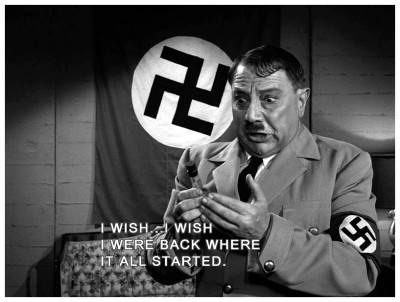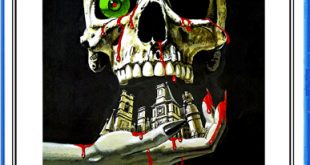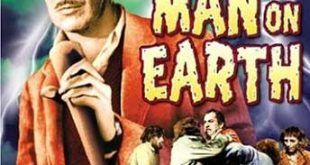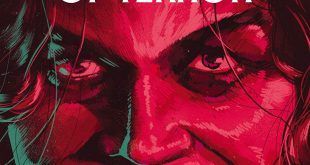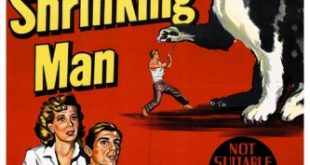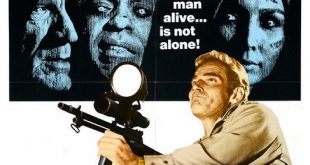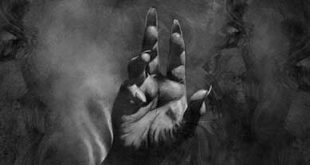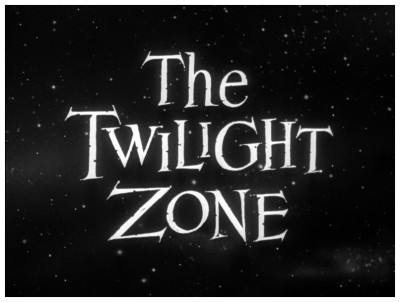 “You’re traveling through another dimension, a dimension not only of sight and sound but of mind. A journey into a wondrous land whose boundaries are that of imagination. That’s the signpost up ahead. Your next stop…The Twilight Zone.”
“You’re traveling through another dimension, a dimension not only of sight and sound but of mind. A journey into a wondrous land whose boundaries are that of imagination. That’s the signpost up ahead. Your next stop…The Twilight Zone.”
#37 KING NINE WILL NOT RETURN – A pilot of a downed WW II bomber comes to in the African desert and desperately tries to find out what happened to the rest of his crew. Directed by Buzz Kulik from a script by Rod Serling starring Robert Cummings & Gene Lyons. This episode was based on the discovery of the B-24 Liberator four-engine bomber ‘Lady Be Good’ and her crew’s remains. They crash-landed at night deep in the Libyan desert after running out of fuel while returning from a bombing run over Romania. In the episode, there is a grave marker with the date 5th April 1943, the actual day the Lady Be Good was lost. The scary suspenseful score by Fred Steiner was later used in other Twilight Zone episodes, and this was the first episode to feature the now-familiar bongo-and-guitar theme by Marius Constant.
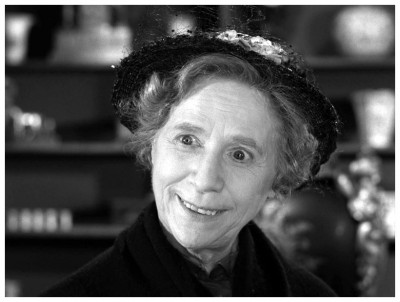 #38 THE MAN IN THE BOTTLE – A luckless couple stumbles upon fortune when a genie materialises from a bottle in their antique shop. The genie grants them four wishes but warns them, prophetically, to be careful what you wish for. Directed by Don Medford from a script by Rod Serling starring Luther Adler & Vivi Janiss. This episode contains elements of both The Bottle Imp (1891) by Robert Louis Stevenson and The Monkey’s Paw (1901) by W.W. Jacobs, which feature objects that can grant wishes to its human possessors. It never ends well. Luther Adler had previously played Hitler in two feature films: The Magic Face (1951), a fantasy about an impersonator who murders ‘der Fuehrer’ and then assumes his identity; and The Desert Fox, concerning tank commander Rommel.
#38 THE MAN IN THE BOTTLE – A luckless couple stumbles upon fortune when a genie materialises from a bottle in their antique shop. The genie grants them four wishes but warns them, prophetically, to be careful what you wish for. Directed by Don Medford from a script by Rod Serling starring Luther Adler & Vivi Janiss. This episode contains elements of both The Bottle Imp (1891) by Robert Louis Stevenson and The Monkey’s Paw (1901) by W.W. Jacobs, which feature objects that can grant wishes to its human possessors. It never ends well. Luther Adler had previously played Hitler in two feature films: The Magic Face (1951), a fantasy about an impersonator who murders ‘der Fuehrer’ and then assumes his identity; and The Desert Fox, concerning tank commander Rommel.
#39 NERVOUS MAN IN A FOUR DOLLAR ROOM – Small-time criminal Jackie Rhoades must face both his past and his conscience while waiting for his next assignment. Directed by Douglas Heyes from a script by Rod Serling starring Joe Mantell & William D. Gordon. The Jackie character is the first to deliver the famous lines, “You talkin’ to me? You talkin’ to me?” while facing a mirror. Most people know these lines from the Martin Scorsese classic Taxi Driver (1976) starring Robert De Niro, but they were first uttered in this episode of The Twilight Zone. Jackie is ordered by his boss to murder for the first time, and confronts his better self in the mirror who begins talking to him. Jackie replies, “You talkin’ to me? You talkin’ to me? Oh yeah. Yeah, sure you are. Now me and the mirror, we’re havin’ a talk. I’ve had it, huh? All my marbles are gone. This is how it happens.”
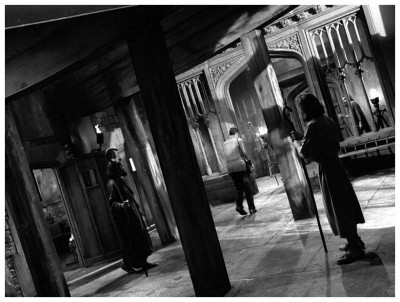 #40 A THING ABOUT MACHINES – Bartlett Finchley is an ill-tempered food critic who hates humanity, but is also lonely. He’s as inept with machines as he is with people. He constantly abuses machines in frustration and starts to think the machines are conspiring against him. People disregard him as paranoid, but eventually every machine in his house begins to turn on him. His typewriter types, “Get Out Of Here Finchley!” The same message appears on his television screen, and a voice on the phone speaks the same words when he tries to make a call. His electric razor rises into the air like a cobra to attack him, and chases him down the stairs. Finchley runs from the house and is chased by his driverless car to the pool, pushing him into the water. He sinks to the bottom and drowns. Later, the police are at a loss to explain how he could sink to the bottom without being weighted down, nor can they explain why the car is parked near the pool. Directed by David Orrick McDearmon from a script by Rod Serling starring Richard Haydn & Barney Phillips.
#40 A THING ABOUT MACHINES – Bartlett Finchley is an ill-tempered food critic who hates humanity, but is also lonely. He’s as inept with machines as he is with people. He constantly abuses machines in frustration and starts to think the machines are conspiring against him. People disregard him as paranoid, but eventually every machine in his house begins to turn on him. His typewriter types, “Get Out Of Here Finchley!” The same message appears on his television screen, and a voice on the phone speaks the same words when he tries to make a call. His electric razor rises into the air like a cobra to attack him, and chases him down the stairs. Finchley runs from the house and is chased by his driverless car to the pool, pushing him into the water. He sinks to the bottom and drowns. Later, the police are at a loss to explain how he could sink to the bottom without being weighted down, nor can they explain why the car is parked near the pool. Directed by David Orrick McDearmon from a script by Rod Serling starring Richard Haydn & Barney Phillips.
#41 THE HOWLING MAN – Seeking refuge from a storm, traveler David Ellington comes upon a bizarre hermitage of monks who have imprisoned a man who begs for his help. When David confronts the head monk Brother Jerome, he is told that the man is Satan himself, and David must decide who to believe. Directed by Douglas Heyes from a script by Charles Beaumont starring John Carradine & Robin Hughes. This was the first aired episode of the second season that was not written by Serling. Beaumont’s original story stated that the monks would keep Satan imprisoned by putting a large crucifix in front of his cell door. Afraid of the possible backlash from the religious communities, the producers changed the crucifix to ‘The Staff Of Truth’ despite Beaumont’s objections.
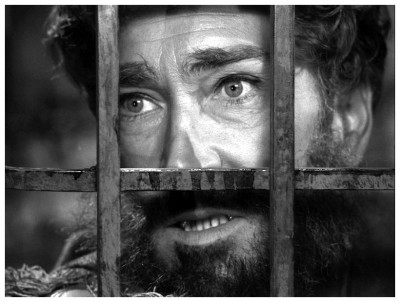 #42 THE EYE OF THE BEHOLDER – A young woman lying in a hospital bed, her head wrapped in bandages, awaits the outcome of a surgical procedure performed by the State in a last-ditch attempt to make her look ‘normal’. Directed by Douglas Heyes from a script by Rod Serling starring Maxine Stuart & Donna Douglas. When director Heyes was casting the episode, his primary concern was finding actors with sympathetic voices. To achieve this he cast the episode with his back to the performers. He found Maxine Stuart, who spoke all her lines while her head was completely wrapped in bandages. Heyes intended to dub over Donna Douglas’ last line with Stuart’s voice, but Douglas was able to imitate her so successfully that she was allowed to speak the line on camera herself. Serling would later recycle the theme for an episode of Night Gallery entitled The Different Ones, which takes place in a futuristic world where a disfigured hermit teenage boy is sent on a NASA rocket to a planet where the inhabitants look just like him.
#42 THE EYE OF THE BEHOLDER – A young woman lying in a hospital bed, her head wrapped in bandages, awaits the outcome of a surgical procedure performed by the State in a last-ditch attempt to make her look ‘normal’. Directed by Douglas Heyes from a script by Rod Serling starring Maxine Stuart & Donna Douglas. When director Heyes was casting the episode, his primary concern was finding actors with sympathetic voices. To achieve this he cast the episode with his back to the performers. He found Maxine Stuart, who spoke all her lines while her head was completely wrapped in bandages. Heyes intended to dub over Donna Douglas’ last line with Stuart’s voice, but Douglas was able to imitate her so successfully that she was allowed to speak the line on camera herself. Serling would later recycle the theme for an episode of Night Gallery entitled The Different Ones, which takes place in a futuristic world where a disfigured hermit teenage boy is sent on a NASA rocket to a planet where the inhabitants look just like him.
#43 NICK OF TIME – A pair of newlyweds stopping in a small town are trapped by their own superstition when playing a fortune telling machine in a local diner. Directed by Richard L. Bare from a script by Richard Matheson starring William Shatner & Patricia Breslin. Matheson was a big fan of Breslin, and wanted her to star opposite Shatner again in the famous season five episode Nightmare At 20,000 Feet, but she was unavailable at the time. The street and building seen in this episode is the same street and building seen in I Sing The Body Electric and, coincidentally, both episodes feature scenes in which people almost become roadkill.
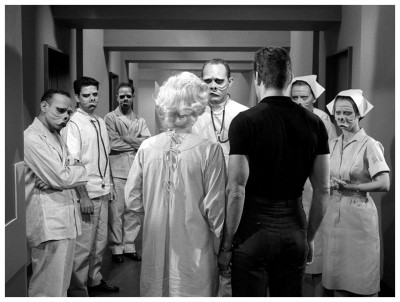 #44 THE LATENESS OF THE HOUR – The daughter of an inventor objects to their ‘perfect’ home where they are waited on by mechanical servants. Directed by Jack Smight from a script by Rod Serling starring Inger Stevens & John Hoyt. The plot point of robots imbued with human memories who believe they are human is similar to that in the film Creation Of The Humanoids (1962) as well as the novel Do Androids Dream Of Electric Sheep? (1968) by Philip K. Dick which was, of course adapted as Blade Runner (1982). This was one of six season two episodes shot on videotape instead of film in an attempt to cut costs. The show was exceeding its budget at US$65,000 per episode, so six consecutive episodes were videotaped and eventually transferred to 16-millimeter film for syndication. Total savings on editing and cinematography amounted to around US$30,000 for all six episodes, not enough to justify the loss of depth of visual perspective. The experiment was deemed a failure and never attempted again.
#44 THE LATENESS OF THE HOUR – The daughter of an inventor objects to their ‘perfect’ home where they are waited on by mechanical servants. Directed by Jack Smight from a script by Rod Serling starring Inger Stevens & John Hoyt. The plot point of robots imbued with human memories who believe they are human is similar to that in the film Creation Of The Humanoids (1962) as well as the novel Do Androids Dream Of Electric Sheep? (1968) by Philip K. Dick which was, of course adapted as Blade Runner (1982). This was one of six season two episodes shot on videotape instead of film in an attempt to cut costs. The show was exceeding its budget at US$65,000 per episode, so six consecutive episodes were videotaped and eventually transferred to 16-millimeter film for syndication. Total savings on editing and cinematography amounted to around US$30,000 for all six episodes, not enough to justify the loss of depth of visual perspective. The experiment was deemed a failure and never attempted again.
#45 THE TROUBLE WITH TEMPLETON – Aging stage actor Booth Templeton is at home, watching his current wife Diane flirt with a gigolo. Booth’s servant, Marty, comes in with his daily medication, and Booth half-jokingly wonders about what will happen when his pills stop working, noting that he hasn’t achieved any contentment. Marty suggests that he tell the director of his current play that he can’t make rehearsal that day, but Booth insists on going, and admits he can’t remember when he ever loved his current wife. The director spots Booth arriving late at the theatre and lectures him on the importance of being on time and ready for rehearsals. He also questions Booth’s commitment to the play. Pressured, Booth runs out of the theatre and suddenly finds a crowd of admirers warmly applauding him for his latest performance. Their attire, nearby vehicles, and a poster inform him that he is inexplicably in 1927, more than thirty years in the past. Directed by Buzz Kulik from a script by E. Jack Neuman starring Brian Aherne & Sydney Pollack.
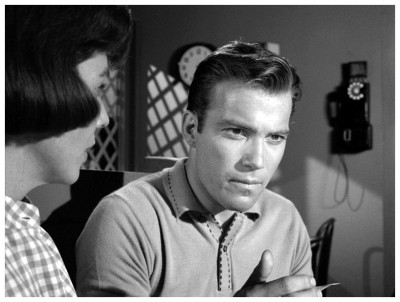 #46 A MOST UNUSUAL CAMERA – Chester and Paula Diedrich are a married couple of petty thieves who have just robbed a curiosity shop, and among the things they have stolen is a strange camera. The pair accidentally discover that it produces photos of five minutes into the future. After Paula’s ex-convict brother Woodward shows up, Chester decides to use the camera to take pictures of the blank winner’s board before races at the local racetrack and then make bets using the camera’s predictions. Returning to their hotel with their winnings, a French waiter named Pierre reads the inscription on the camera: ‘Dix à La Propriétaire’ – ‘Ten To An Owner’. The trio argue over how to use the last two pictures and, while fighting over the camera, take a picture of Paula screaming and recoiling in horror. Chester and Woodward continue to fight and fall out a window to their deaths. Paula screams – as in the picture – but recovers immediately when she realises that all the money and loot is now hers. Directed by John Rich from a script by Rod Serling starring Fred Clark & Jean Carson.
#46 A MOST UNUSUAL CAMERA – Chester and Paula Diedrich are a married couple of petty thieves who have just robbed a curiosity shop, and among the things they have stolen is a strange camera. The pair accidentally discover that it produces photos of five minutes into the future. After Paula’s ex-convict brother Woodward shows up, Chester decides to use the camera to take pictures of the blank winner’s board before races at the local racetrack and then make bets using the camera’s predictions. Returning to their hotel with their winnings, a French waiter named Pierre reads the inscription on the camera: ‘Dix à La Propriétaire’ – ‘Ten To An Owner’. The trio argue over how to use the last two pictures and, while fighting over the camera, take a picture of Paula screaming and recoiling in horror. Chester and Woodward continue to fight and fall out a window to their deaths. Paula screams – as in the picture – but recovers immediately when she realises that all the money and loot is now hers. Directed by John Rich from a script by Rod Serling starring Fred Clark & Jean Carson.
#47 THE NIGHT OF THE MEEK – After a derelict Santa Claus is fired on Christmas Eve, he finds a mysterious bag that gives out presents. With this bag he sets out to fulfill his one wish – to see the less fortunate inherit the bounties of Christmas. Directed by Jack Smight from a script by Rod Serling starring Art Carney & John Fiedler. Serling’s closing narration: “A word to the wise to all the children of the twentieth century, whether their concern be pediatrics or geriatrics, whether they crawl on hands and knees and wear diapers or walk with a cane and comb their beards. There’s a wondrous magic to Christmas and there’s a special power reserved for little people. In short, there’s nothing mightier than the meek.” The original narration ended with the words, “And a Merry Christmas to each and all,” but the phrase was deleted in the eighties after it was deemed politically incorrect. The phrase was re-inserted for the recent Blu-ray release, but it has a distinctly different sound quality to the rest of Serling’s narration.
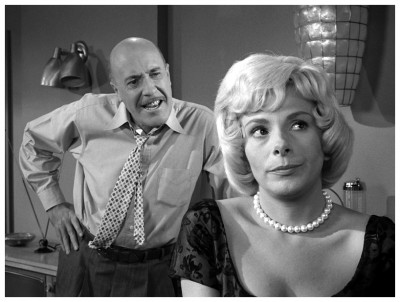 #48 DUST – In the Old West a condemned man has been found guilty of accidentally causing the death of a child. An unscrupulous peddler sells some five-strand rope to the executioner for a hanging, and also sells a bag of ‘magic’ dust to the father of the condemned man, collecting it from the ground and insisting that it will make the crowd feel love and sympathy for the man sentenced to be hanged. The crowd gathers for the hanging and the man’s father starts sprinkling the dust everywhere. To his dismay, he hears the floor drop behind him and turns to see that the fresh and sturdy noose has broken and his son is unharmed. When asked if another hanging attempt should be made, the girl’s parents decide that it shouldn’t, that the condemned man has suffered enough. Father and son head home, and the peddler discovers that he is also affected by the ‘magic’ after throwing his earnings to the poor children and laughing about it afterward. Directed by Douglas Heyes from a script by Rod Serling starring Thomas Gomez & John Larch.
#48 DUST – In the Old West a condemned man has been found guilty of accidentally causing the death of a child. An unscrupulous peddler sells some five-strand rope to the executioner for a hanging, and also sells a bag of ‘magic’ dust to the father of the condemned man, collecting it from the ground and insisting that it will make the crowd feel love and sympathy for the man sentenced to be hanged. The crowd gathers for the hanging and the man’s father starts sprinkling the dust everywhere. To his dismay, he hears the floor drop behind him and turns to see that the fresh and sturdy noose has broken and his son is unharmed. When asked if another hanging attempt should be made, the girl’s parents decide that it shouldn’t, that the condemned man has suffered enough. Father and son head home, and the peddler discovers that he is also affected by the ‘magic’ after throwing his earnings to the poor children and laughing about it afterward. Directed by Douglas Heyes from a script by Rod Serling starring Thomas Gomez & John Larch.
#49 BACK THERE – On April 14th 1961, young professor Peter Corrigan is involved in a discussion with colleagues at the Potomac Club on the question of whether events in history could be changed if time travel were possible. After bumping into an attendant named William on the way out, Peter feels faint. Confused by the gas lamps and horse-drawn carriages on the street, he notices that he’s wearing clothes of a much older style and decides to walk home. He finds that his ‘home’ is a boarding house and that it’s April 14th 1865, the day of Abraham Lincoln’s assassination. Peter rushes to Ford’s Theatre to warn everyone but is arrested for disturbing the peace. He is released into the custody of a Mr. John Wellington, and Peter continues to implore Wellington and others to warn and protect the president. Wellington offers Peter a drink, and immediately afterwards, Peter realises that he has been drugged, presumably because Wellington doesn’t believe him and wants him quiet. Directed by David Orrick McDearmon from a script by Rod Serling starring Russell Johnson & Paul Hartman.
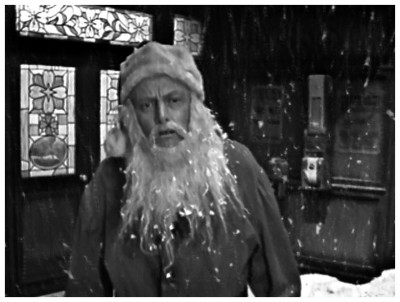 #50 THE WHOLE TRUTH – A used car salesman buys a car that dooms him to tell only the truth! Directed by James Sheldon from a script by Rod Serling starring Jack Carson & Arte Johnson. This episode shows video artifacts of the image orthicon tube used in television cameras of the era. When the shiny fenders of the cars catch the light, the glint produces an unwanted dark halo around the glint, and such artifacts can also be seen in Night Of The Meek. John F. Kennedy was sworn in as the 35th President of the United States at the Inaugural ceremonies held in Washington on the afternoon of the very day this episode originally aired, which means Carson’s final line was not only very topical, it’s one of the rare times a current president was actually mentioned in a Twilight Zone episode.
#50 THE WHOLE TRUTH – A used car salesman buys a car that dooms him to tell only the truth! Directed by James Sheldon from a script by Rod Serling starring Jack Carson & Arte Johnson. This episode shows video artifacts of the image orthicon tube used in television cameras of the era. When the shiny fenders of the cars catch the light, the glint produces an unwanted dark halo around the glint, and such artifacts can also be seen in Night Of The Meek. John F. Kennedy was sworn in as the 35th President of the United States at the Inaugural ceremonies held in Washington on the afternoon of the very day this episode originally aired, which means Carson’s final line was not only very topical, it’s one of the rare times a current president was actually mentioned in a Twilight Zone episode.
#51 THE INVADERS – An old woman lives alone in a rustic cabin. She is dressed shabbily, and there are no modern conveniences in evidence. After hearing a strange noise on her kitchen roof, she is accosted by small intruders that come from a miniature flying saucer that has landed on the roof. Two tiny robotic figures about 15 centimetres tall, emerge from the craft. She battles them for many minutes, eventually killing one and following the other back to its spaceship, which she proceeds to smash. From within the craft she hears a voice speaking in English with an American accent, warning fellow astronauts that the people on this planet are giants and impossible to defeat. The woman destroys the ship and collapses, quite exhausted. The camera pans revealing the words US Air Force Space Probe #1 on the side of the spaceship – the so-called ‘invaders’ are humans from Earth and the woman in the small farmhouse is the alien monster. Directed by Douglas Heyes from a script by Richard Matheson starring Agnes Moorehead.
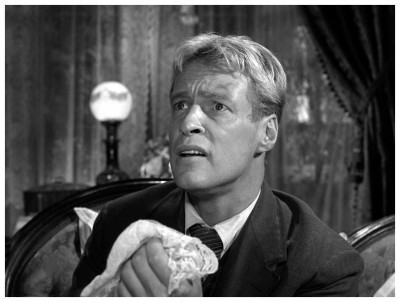 #52 A PENNY FOR YOUR THOUGHTS – Hector Poole, a sensitive insecure bank clerk, gains telepathic powers after tossing a coin that miraculously stands on its edge. Suddenly he is able to hear other people’s thoughts, and is surprised to hear the things people are thinking around him. He first hears his boss thinking about a weekend affair he is planning with his mistress, then a businessman named Sykes thinks about taking out a large loan to gamble on a horse in order to win back money he embezzled from his company. Hector informs his boss, Mr. Bagby, and thwarts the businessman’s plans. Shortly afterwards Hector uncovers an apparent plot by an old trusted employee named Smithers to steal from the bank, and alerts Bagby. The plot is disproved – the veteran bank employee admits he has fantasised about stealing from the bank but would never go through with such a plan. Bagby fires Hector, but reinstates him when Sykes is arrested for embezzlement. Hector uses his knowledge of Bagby’s mistress to blackmail his boss into promoting him and giving Smithers a long-overdue vacation. After work, as Hector returns home with Miss Turner, he inadvertently knocks over the standing coin. His mind-reading ability is gone, but he is still a changed man, for the better. Directed by James Sheldon from a script by George Clayton Johnson starring Dick York & June Dayton.
#52 A PENNY FOR YOUR THOUGHTS – Hector Poole, a sensitive insecure bank clerk, gains telepathic powers after tossing a coin that miraculously stands on its edge. Suddenly he is able to hear other people’s thoughts, and is surprised to hear the things people are thinking around him. He first hears his boss thinking about a weekend affair he is planning with his mistress, then a businessman named Sykes thinks about taking out a large loan to gamble on a horse in order to win back money he embezzled from his company. Hector informs his boss, Mr. Bagby, and thwarts the businessman’s plans. Shortly afterwards Hector uncovers an apparent plot by an old trusted employee named Smithers to steal from the bank, and alerts Bagby. The plot is disproved – the veteran bank employee admits he has fantasised about stealing from the bank but would never go through with such a plan. Bagby fires Hector, but reinstates him when Sykes is arrested for embezzlement. Hector uses his knowledge of Bagby’s mistress to blackmail his boss into promoting him and giving Smithers a long-overdue vacation. After work, as Hector returns home with Miss Turner, he inadvertently knocks over the standing coin. His mind-reading ability is gone, but he is still a changed man, for the better. Directed by James Sheldon from a script by George Clayton Johnson starring Dick York & June Dayton.
#53 TWENTY TWO – While in the hospital recovering from overwork, Liz Powell keeps dreaming about going down to the hospital morgue. Directed by Jack Smight from a script by Bennett Cerf starring Barbara Nichols & Jonathan Harris. The original 1906 story by E.F. Benson features a large middle-aged male protagonist named Hugh Grainger from the English country visiting a friend in London. He is haunted by a man dressed like a bus conductor, driving a horse-drawn hearse. He sees the same man a month later actually driving a bus that is involved in a tremendous auto accident. The 1944 version by Cerf features instead a young New York woman visiting the Carolina plantation of distant relatives, with the hearse’s coachman eventually revealed to be the operator of a medical building elevator that plummets when its cables break. In the film Dead Of Night (1944) the protagonist is again male, also with the name Hugh Grainger, haunted by a man driving a hearse and has a premonition about a fatal bus crash.
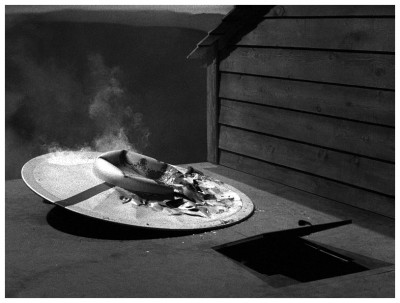 #54 THE ODYSSEY OF FLIGHT 33 – This episode takes place on Global Airlines Flight 33, en route from London to New York. About fifty minutes out of Idlewild airport, Captain Farver and his crew notice that their Boeing 707 is drastically increasing speed, repeatedly crossing some kind of barrier. With their equipment and radio malfunctioning, they eventually realise they have been thrown back in time when they see no signs of civilisation but spot a huge plodding dinosaur. They increase altitude in an attempt to cross the barrier again, but arrive above the 1939 New York World’s Fair instead. Unable to land at LaGuardia airport in 1939 and low on fuel, the captain decides to keep trying to return home to 1961. This is one of the few episodes that offered no resolution nor a twist in the tale. Directed by Jus Addiss from a script by Rod Serling starring John Anderson & Sandy Kenyon.
#54 THE ODYSSEY OF FLIGHT 33 – This episode takes place on Global Airlines Flight 33, en route from London to New York. About fifty minutes out of Idlewild airport, Captain Farver and his crew notice that their Boeing 707 is drastically increasing speed, repeatedly crossing some kind of barrier. With their equipment and radio malfunctioning, they eventually realise they have been thrown back in time when they see no signs of civilisation but spot a huge plodding dinosaur. They increase altitude in an attempt to cross the barrier again, but arrive above the 1939 New York World’s Fair instead. Unable to land at LaGuardia airport in 1939 and low on fuel, the captain decides to keep trying to return home to 1961. This is one of the few episodes that offered no resolution nor a twist in the tale. Directed by Jus Addiss from a script by Rod Serling starring John Anderson & Sandy Kenyon.
#55 MR. DINGLE THE STRONG – In an experiment, two invisible Martians give wimpy vacuum-cleaner salesman Luther Dingle superhuman strength. After discovering his unexplainable powers, Dingle begins performing various feats of strength, from lifting statues to splitting boulders and gains a great deal of publicity. The Martians return and are disappointed to see that Dingle is using his strength only for show. They take his strength away just as he attempts to lift a building live on television. Unable to make good on his claims or repeat any of his previous feats, he becomes a laughingstock. As the Martians leave, they meet two Venusians looking for a suitable Earthling for their own experiments. The Martians recommend Dingle, and the Venusians give Dingle super-intelligence. Discovering his new powers, Dingle starts thinking aloud at an alarming rate and demonstrates incredible powers of prediction. Directed by John Brahm from a script by Rod Serling starring Burgess Meredith & James Westerfield.
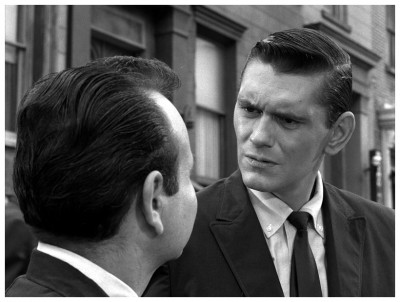 #56 STATIC – An old radio is taking bitter bachelor Ed Lindsay back to a happier time before television when he starts picking up radio programs from the thirties and forties. Directed by Buzz Kulik from a script by Charles Beaumont based on a story by Oceo Ritch starring Dean Jagger & Carmen Matthews. Even though the six video-taped episodes were shot together, they were broadcast out-of-order with this, the second one, shown as season two episode #20. The first, The Lateness Of The Hour, was screened as season two episode #8. The third, The Whole Truth, appeared as season two episode #14. The fourth was Night Of The Meek, shown as season two episode #11. The fifth, Twenty-Two, was screened as season two episode #17. The last one, Long Distance Call, was broadcast as season two episode #22.
#56 STATIC – An old radio is taking bitter bachelor Ed Lindsay back to a happier time before television when he starts picking up radio programs from the thirties and forties. Directed by Buzz Kulik from a script by Charles Beaumont based on a story by Oceo Ritch starring Dean Jagger & Carmen Matthews. Even though the six video-taped episodes were shot together, they were broadcast out-of-order with this, the second one, shown as season two episode #20. The first, The Lateness Of The Hour, was screened as season two episode #8. The third, The Whole Truth, appeared as season two episode #14. The fourth was Night Of The Meek, shown as season two episode #11. The fifth, Twenty-Two, was screened as season two episode #17. The last one, Long Distance Call, was broadcast as season two episode #22.
#57 THE PRIME MOVER – Small-time gambler Ace Larsen discovers that his partner, Jimbo Cobb, has telekinetic powers after a car overturns outside their café. Ace plans to use Jimbo’s powers to win big in Las Vega and takes his girlfriend Kitty with them. Ace wins big, disregarding Jimbo’s headaches and his growing moral concerns over what they are doing. Ace then bets all his winnings on a game of dice, just as Jimbo’s powers fade. The loss awakens Ace to the reality of what he has become, and he and Jimbo have a good laugh over their misfortune. The three return home convinced that Jimbo’s powers are permanently gone. Ace asks Kitty to marry him just as Jimbo drops his broom. She flips a coin and Ace calls ‘heads’. Kitty doesn’t tell him the result, she simply accepts his proposal. As they embrace, Jimbo picks up the broom – telekinetically. Directed by Richard L. Bare from a script by Charles Beaumont starring Buddy Ebsen & Dane Clark.
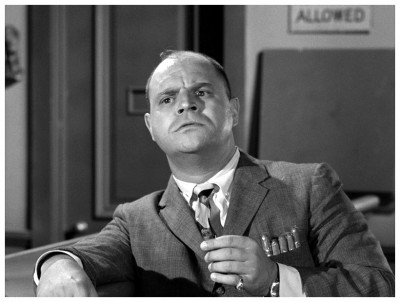 #58 LONG DISTANCE CALL – A boy named Billy communicates with his grandmother using a toy telephone that she gave him on his birthday before she died. Billy starts spending much of his time having ‘pretend’ conversations with his deceased grandmother. One day Billy deliberately runs out in front of a car, saying someone told him to do it. His mother takes the toy phone away, so Billy attempts to drown himself, almost succeeding. His parents are informed that Billy’s chances aren’t good, so his father picks up the toy phone and begs his mother to give Billy’s life back. The paramedics successfully revive Billy as his parents embrace. Directed by James Sheldon from a script by Charles Beaumont & Bill Idelson starring Philip Abbott & Lili Darvas. A replica of the toy telephone is usually on display in the gift shop window at the Hollywood Tower Hotel in Disney’s California Adventure park. The red toy telephone is described as ‘Perfect for the children’s room and those late night calls from grandma’.
#58 LONG DISTANCE CALL – A boy named Billy communicates with his grandmother using a toy telephone that she gave him on his birthday before she died. Billy starts spending much of his time having ‘pretend’ conversations with his deceased grandmother. One day Billy deliberately runs out in front of a car, saying someone told him to do it. His mother takes the toy phone away, so Billy attempts to drown himself, almost succeeding. His parents are informed that Billy’s chances aren’t good, so his father picks up the toy phone and begs his mother to give Billy’s life back. The paramedics successfully revive Billy as his parents embrace. Directed by James Sheldon from a script by Charles Beaumont & Bill Idelson starring Philip Abbott & Lili Darvas. A replica of the toy telephone is usually on display in the gift shop window at the Hollywood Tower Hotel in Disney’s California Adventure park. The red toy telephone is described as ‘Perfect for the children’s room and those late night calls from grandma’.
#59 A HUNDRED YARDS OVER THE RIM – In the year 1847, Christian Horn is one of the leaders of a small wagon train from Ohio attempting to reach California. When his son becomes dangerously ill, he sets off alone in a desperate search for water. He crosses over a high sandy hill rim and suddenly finds himself in 1961 Arizona. He is stunned to see power lines, a seemingly endless hard black road and a loud, fast-moving metal monster coming at him. As the truck zooms past, Horn stumbles, accidentally firing his rifle and slightly wounding his arm. He finds a roadside café, but arouses too much curiosity. The local doctor alerts the sheriff but Horn runs back to the rim, narrowly escaping back to the wagon party and his son, holding in his hand a bottle of penicillin from 1961 that can cure his son’s illness. After giving his son the medicine, he leads the party on toward California. Meanwhile, the café owner who had chased Horn to the top of the rim could only find his rifle lying on the ground. Now more than a hundred years old, the rifle falls apart at his touch. Directed by Buzz Kulik from a script by Rod Serling starring Cliff Robertson & John Crawford.
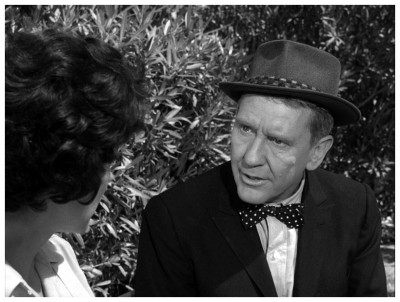 #60 THE RIP VAN WINKLE CAPER – To escape the law after stealing a million dollars worth of gold bullion, a band of four thieves led by scientist-mastermind Farwell hide out in a secret cave in Death Valley. Farwell has designed and built cryogenic chambers set to open in one hundred years time. When they wake up, things begin to go awry. All that remains of Erbie is his skeleton, and greed soon begins to consume the others. DeCruz kills Brooks by running him over with the truck, then crashes into a ravine, so Farwell and DeCruz are forced to walk across the desert with as much gold as they can carry. Farwell loses his canteen so DeCruz offers him a sip of water for the price of one gold bar. When the fee goes up to two bars, Farwell kills DeCruz, and soon finds a highway. Weak and dehydrated, he collapses as a futuristic car drives up. He offers his gold to the driver in exchange for water and a ride into town, but soon dies. The driver remarks, “He offered this to me as if it was really worth something.” His companion recalls that gold had indeed once been valuable, to which the driver replies, “Sure, about a hundred years or so ago, before they found a way of manufacturing it.” Directed by Jus Addiss from a script by Rod Serling starring Simon Oakland & Oscar Beregi Junior.
#60 THE RIP VAN WINKLE CAPER – To escape the law after stealing a million dollars worth of gold bullion, a band of four thieves led by scientist-mastermind Farwell hide out in a secret cave in Death Valley. Farwell has designed and built cryogenic chambers set to open in one hundred years time. When they wake up, things begin to go awry. All that remains of Erbie is his skeleton, and greed soon begins to consume the others. DeCruz kills Brooks by running him over with the truck, then crashes into a ravine, so Farwell and DeCruz are forced to walk across the desert with as much gold as they can carry. Farwell loses his canteen so DeCruz offers him a sip of water for the price of one gold bar. When the fee goes up to two bars, Farwell kills DeCruz, and soon finds a highway. Weak and dehydrated, he collapses as a futuristic car drives up. He offers his gold to the driver in exchange for water and a ride into town, but soon dies. The driver remarks, “He offered this to me as if it was really worth something.” His companion recalls that gold had indeed once been valuable, to which the driver replies, “Sure, about a hundred years or so ago, before they found a way of manufacturing it.” Directed by Jus Addiss from a script by Rod Serling starring Simon Oakland & Oscar Beregi Junior.
#61 THE SILENCE – Colonel Archie Taylor, a gruff aristocrat, has difficulty enjoying his men’s club because of the constant chatter of fellow member Jamie Tennyson. Just as irritating is the content, which usually concludes with a transparent attempt to curry investors. The Colonel proposes a wager and has an attendant deliver a note to Tennyson, whose subsequent speechlessness amuses the other members. The Colonel explains that he has proposed a wager with Tennyson, betting $500,000 that the younger man cannot remain silent for an entire year. Tennyson is offended but agrees to the wager, requesting only that the Colonel write a cheque in his name to be witnessed by all members of the club. He is then enclosed in the club’s game room, in a small glass-walled apartment. Tennyson is monitored by microphones and any requests he makes must be made in writing. Directed by Boris Sagal from a script by Rod Serling starring Franchot Tone & Jonathan Harris.
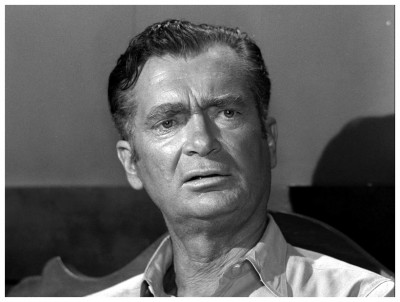 #62 SHADOW PLAY – A man convicted of murder, Adam Grant, tries to convince those about to execute him that the world all around them is just his recurring nightmare. The story opens with the jury finding Grant guilty of murder. He claims that everyone in the courtroom are all people playing parts in his recurring nightmare. He points out obvious logical errors such as the fact his arrest, trial and execution are all happening on the same day, and his fellow prisoners are merely generic stereotypes. Grant explains to the DA that he is unable to sleep because he always wakes up screaming, and tells the DA to go home and he will find that what he thought was for dinner will be something else. The DA reasons that such crazy talk would constitute reasonable doubt as to his sanity, and calls the governor to arrange a stay of execution. The message arrives too late and we discover that Grant was correct – the world is a dream for them and a nightmare for him. Directed by John Brahm from a script by Charles Beaumont starring Dennis Weaver & Harry Townes.
#62 SHADOW PLAY – A man convicted of murder, Adam Grant, tries to convince those about to execute him that the world all around them is just his recurring nightmare. The story opens with the jury finding Grant guilty of murder. He claims that everyone in the courtroom are all people playing parts in his recurring nightmare. He points out obvious logical errors such as the fact his arrest, trial and execution are all happening on the same day, and his fellow prisoners are merely generic stereotypes. Grant explains to the DA that he is unable to sleep because he always wakes up screaming, and tells the DA to go home and he will find that what he thought was for dinner will be something else. The DA reasons that such crazy talk would constitute reasonable doubt as to his sanity, and calls the governor to arrange a stay of execution. The message arrives too late and we discover that Grant was correct – the world is a dream for them and a nightmare for him. Directed by John Brahm from a script by Charles Beaumont starring Dennis Weaver & Harry Townes.
#63 THE MIND AND THE MATTER – Archibald Beechcroft has had an insufferable time trying to find a job. He becomes annoyed when an errand boy named Henry spills coffee all over his suit. Taking some aspirin, a co-worker named Rogers advises him that he needs to keep fit to avoid headaches. Beechcroft explains that he eats well, doesn’t drink alcohol or stay out late – he’s simply tired of being pushed around and wants to eliminate all the people of the world. Because he feels guilty about spilling the coffee, Henry gives Beechcroft a book entitled The Mind And The Matter. The book intrigues Beechcroft and he continues to read it on the train ride home. As he reads the last page he concludes that concentration is indeed the most underrated power in the universe. It then occurs to him that he can use concentration to realise his dream of eliminating people. He tests his theory out on his landlady, whom he successfully makes disappear: “Today the landlady – tomorrow the world!” Directed by Buzz Kulik from a script by Rod Serling starring Shelley Berman & Jack Grinnage.
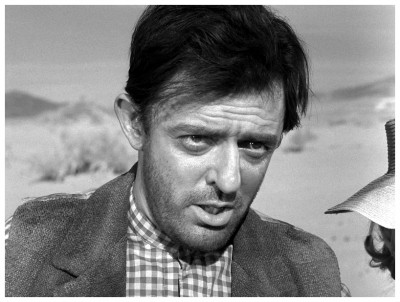 #64 WILL THE REAL MARTIAN PLEASE STAND UP? – Following a phone call about a crashed spaceship, two policeman try to determine who among the passengers of a bus at a snowed-in roadside diner is from another world. Directed by Montgomery Pittman from a script by Rod Serling starring John Hoyt & Jack Elam. This episode is unique in that an actual Twilight Zone contributor is mentioned. When the patrons discover that one of them is an alien, Elam’s character laughs and says, “She’s just like science fiction, that’s what she is! A regular Ray Bradbury!” One of Bradbury’s stories, I Sing The Body Electric, became an episode during the third season.
#64 WILL THE REAL MARTIAN PLEASE STAND UP? – Following a phone call about a crashed spaceship, two policeman try to determine who among the passengers of a bus at a snowed-in roadside diner is from another world. Directed by Montgomery Pittman from a script by Rod Serling starring John Hoyt & Jack Elam. This episode is unique in that an actual Twilight Zone contributor is mentioned. When the patrons discover that one of them is an alien, Elam’s character laughs and says, “She’s just like science fiction, that’s what she is! A regular Ray Bradbury!” One of Bradbury’s stories, I Sing The Body Electric, became an episode during the third season.
#65 THE OBSOLETE MAN – In a future totalitarian society, a librarian is declared obsolete and sentenced to death. Directed by Elliot Silverstein from a script by Rod Serling starring Fritz Weaver & Burgess Meredith. This episode was meant to highlight the dangers of totalitarianism. Wordsworth compares the Chancellor to Hitler and Stalin, and asks, “Does history teach you nothing?” The Chancellor replies, “On the contrary, history teaches us everything,” and then argues that Hitler and Stalin were not actually evil, in fact they did not go far enough. The episode also puts emphasis on the importance of art, philosophy, literature, freedom of religion and freedom of speech.
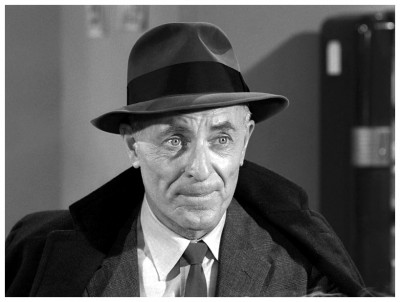 Thanks to Wikipedia for certain information, and a big thanks to Marc Scott Zicree, author of the definitive tome The Twilight Zone Companion, one of the first (and still one of the best) television episode guide books ever to be published. If you have any interest in the early formative days of American television, Mr. Zicree’s volume should definitely be at the top of your list. I’ll bid you a good night and look forward to your company next week when I have the opportunity to put goose-bumps on your goose-bumps with more ambient atmosphere so thick and chumpy you could carve it with a chainsaw, in yet another pants-filling fright-night for…Horror News! Toodles!
Thanks to Wikipedia for certain information, and a big thanks to Marc Scott Zicree, author of the definitive tome The Twilight Zone Companion, one of the first (and still one of the best) television episode guide books ever to be published. If you have any interest in the early formative days of American television, Mr. Zicree’s volume should definitely be at the top of your list. I’ll bid you a good night and look forward to your company next week when I have the opportunity to put goose-bumps on your goose-bumps with more ambient atmosphere so thick and chumpy you could carve it with a chainsaw, in yet another pants-filling fright-night for…Horror News! Toodles!
 Horror News | HNN Official Site | Horror Movies,Trailers, Reviews
Horror News | HNN Official Site | Horror Movies,Trailers, Reviews
